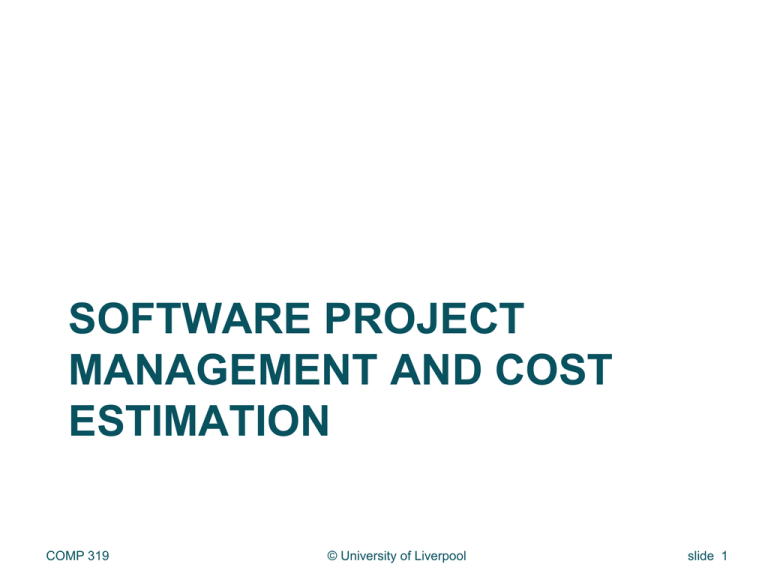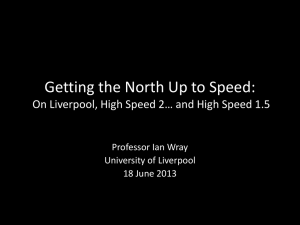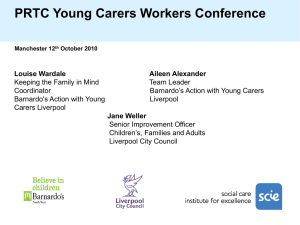lecture004 - University of Liverpool
advertisement

SOFTWARE PROJECT MANAGEMENT AND COST ESTIMATION COMP 319 © University of Liverpool slide 1 1. “Pick two from three” COMP319 © University of Liverpool slide 2 The Constraint Triangle Time Cost COMP319 Quality © University of Liverpool slide 3 Constraint trade off • Not always possible, so • Cost - Increasing cost/resources will not always reduce time or increase quality - Why is this? • Time - Increasing time will not always increase quality? - Why? COMP319 © University of Liverpool slide 4 What cause costs? • People - More people more cost • Hours per person per day • Using bought in software • Outsourcing • Hardware COMP319 © University of Liverpool slide 5 Time/Cost trade off • To reduce time - Use more people - Buy in external software - Get staff to work longer hours COMP319 © University of Liverpool slide 6 Time constraint • Software components are often dependent • The more work done with class design, easier it is to decrease the development time … splitting the task.. • Remember 20-80 rule, keep specification prioritized • People working longer hours will make more mistakes, which need fixing COMP319 © University of Liverpool slide 7 Quality/time • More time may deliver more quality but only - If time is spent doing testing and QA and not adding more functionality - If software development is progressive not regressive (see source control) - There are proper processes for QA COMP319 © University of Liverpool slide 8 Why disasters happen ? • Poor schedule monitoring • Poor analysis of slippage resulting in remedies that rely on adding manpower • Milestones and granularity - Fine grained COMP319 © University of Liverpool slide 9 Software Project Estimation • • • • Software development takes time Estimating the time needed is hard Disasters continue to happen Good management and good schedule monitoring are key to avoiding problems COMP319 © University of Liverpool slide 10 Mythical man month • Author : Fred Brookes - Prof. Comp Science at University of North Carolina - Project manager of IBM 360 OS project • Why mythical? - If 4 programmers can complete a task complete a task in 6 months - How long will it take 24 programmers to complete the same task? (1 month, 3 months, >6) COMP319 © University of Liverpool slide 11 Schedule slippage COMP319 © University of Liverpool slide 12 Slippage delay Assumption 1 Assuming only task 1 is underestimated, workload left = 9 mm To do 9 man/month work in 2 months needs 5 staff, 2 extra COMP319 © University of Liverpool slide 13 Slippage delay Assumption 2 Assuming all tasks are underestimated, workload left = 18 mm To do 18 man/month work in 2 months needs 9 staff, 6 extra COMP319 © University of Liverpool slide 14 Further strategies • Strategy 1 - Reschedule to take a longer time with the same team • Strategy 2 - Trim the task to ensure completion on the same time schedule (use triage to determine trim) COMP319 © University of Liverpool slide 15 Triage • Feature triage - Must do, good to do, nice to do • Testing/debug triage - Must fix, good to fix, nice to fix Desirable Useable Critical COMP319 © University of Liverpool slide 16 Analysis • Assuming that the project can complete in 4 months is a disaster ! COMP319 © University of Liverpool slide 17 COMP319 © University of Liverpool slide 18 Sequential constraints COMP319 © University of Liverpool slide 19 Task partitioning • Partitioning design class by class • Partitioning class up, method by method • Class interface - Defined in the design phase • Class stub - Can be generated automatically - Might need simulation code (e.g. stock ticker to produce random prices) COMP319 © University of Liverpool slide 20 In practise • Many software engineers/project managers will under-estimate tasks - Lack of experience - Not accounting for contingency - Pressure from management - Assuming everyone is as skilled as you! • Important to manage expectations - x 2 (x 3) all your personal estimates - Keep a record of your forecast against actual performance - Sandbag risky activities (e.g. ones dependent on external parties) COMP319 © University of Liverpool slide 21 In practise • Managing expectations - Give bad news as it happens (not all at the end of the project) - Give management alternatives (such as delivery in phases) - Put in place plan on how to trim task - Explain how reducing test time for example could lead to commercial disaster - In general most overruns will be in test time COMP319 © University of Liverpool slide 22








